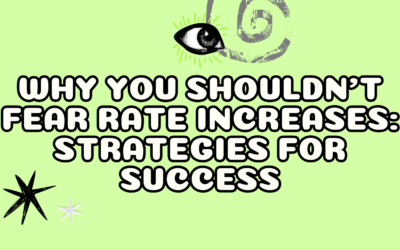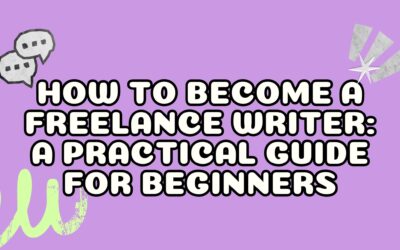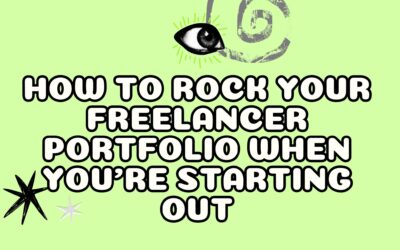Today, I’m handing over the blog to Erika Rykun who has written a great guide to choosing a freelance career. If you’re on the fence or aren’t sure what’s involved, this will definitely help…
Traditional forms of works are becoming less popular every year while the freelance economy is growing day by day.
The increasing demand for freelance experts can be seen in the number of open positions and the success of global freelance platforms.
Experts from Upwork estimate that by 2027, the majority of the workforce in the United States will be freelancers. In the UK, there’s a 31% increase each year in the number of freelancers.
In other words, one in two of us will be a freelancer soon.
Moreover, for many of our kids freelancing will be the only possible option.
Have you already got a freelance career for yourself?
If you haven’t — here’s a helpful guide that will give you a clear picture of getting your first freelance client.
Who – or what – is a freelancer?
Let’s make it clear, a freelancer is a self-employed person who provides services to several companies at the same time.
Quite often, freelance jobs cover creative industries – that’s the focus of Freelance Magic.
Usually, there is no difference between the responsibilities of a freelancer and an ordinary company employee.
However, they are not considered to be the employees but the contractors in relation to the companies they work for.
There are 5 major types of freelance contracts:
- Independent contractor (working on a project to project basis)
- Moonlighter (side hustling with freelance work in spare time, combining with full-time employment)
- Diversified worker (working for a diverse range of employees)
- Temporary worker (employed by companies for a fixed amount of time)
- Freelance business owner (the business owner who has employees who still remain self-employed)

Image by macrovector on Freepik.com
The pros and cons of a freelance career
In case you are seriously considering the opportunity of becoming a freelancer, it is essential to outline all the arguments for and against.
Being ahead of the challenges you may face, we defined the key points for you:
Pros of freelancing
- Flexible schedule – you can choose when to work and set your schedule according to your habits or biorhythms
- Workload control – set your own goals and work in the directions which are more preferable for you.
- Independence – freelance jobs guarantee independence. Working alone is much more comfortable for many people.
- Workplace zen – your location is not important when you are a freelancer. Choose any place as your workplace and feel your zen.
According to Slash Workers, 41% of freelancers plan on freelancing forever as 45% of freelancers feel more secure about their independent employment.

Cons of freelancing
- No employer benefits – companies usually provide some benefits to their employees. Since freelancers are self-employed they are responsible for their perks and benefits.
- Taxes – taxes are the main drawback. It is essential to consider all the regulations and laws to make everything work properly.
- Ultimate responsibility – when you are a freelancer you run your own business. You need to make numerous decisions and bear responsibilities for them.
What are the main freelance career options?
There is a wide range of skills which are suitable for freelance – you can literally be anything from a dog walker to a home baker and be self-employed. But, for the purpose of this article, we’re covering key freelance options that fall into the creative industries.
While there is a variety of options,some of them are particularly profitable and relevant:
- Web design (User experience (UX) designer, User interface (UI) designer, Information architecture (IA) designer)
- Web developer (Front-end developer, Back-end developer, Full stack developer, Mobile web developer)
- Marketers (SEO specialist, Publicist, Email marketer, Social media marketer, E-commerce manager, Product marketer/manager, Content marketer/strategist/director)
- Writing (Copywriter, Content writer, White paper/e-book writer, Technical writer, Managing editor, Proofreader, Translator)
For instance, if you feel some creative power to write, edit or proofread ghostwriting may be a good option for you. Consider further reading on this topic in our guide guide to becoming a ghostwriter.

What you can earn as a freelancer?
The million dollar question, right?
Going freelance is a drastic career shift and so it should be supported by obvious financial benefits. Of course, there’s definite answer to how much you can make as a freelancer (some freelancers earn $20,000 a year, while others will be pulling in six-figure salaries without breaking a sweat).
Your salary will depend on numerous factors like a field of work, expertise, and skill set.
However, you can always look up for this information before making your final decision. For instance, according to Glassdoor data, the average base pay of freelance designers is $79,038 a year.
How do you know which freelance career is right for you?
Deciding whether to go freelance and what services to provide is both exciting and daunting at the same time. Before moving forward, take a breath and spend some time on self-analysis and meditation.
Is freelancing a right choice for you? Will you not regret this decision in the future?
Here are a few ways to find out what is your talent and whether you’re ready for a freelance career.
What are your talents?
Naturally, we are particularly talented in some aspects.
Think of the things you are good at, what work brings you joy and satisfaction.
If you do not feel like you’re a gifted person, you probably are, but don’t panic! Natural talent is not a must-have for a freelance career. Likewise, don’t worry if you feel like you’re good at many things, as according to Slash Workers 61% of freelancers specialize in 2 to 3 talents.

What fits your personality?
Strange as it may seem, freelancing isn’t for everyone.
There are some traits that most freelancers have in common. These traits are self-motivation, a strong work ethic, organisational skills, and a firm backbone. It would be better for you to learn in advance whether you have or can develop these traits. Take a look at our guide to getting started freelancing to see whether you’re cut from the right cloth.
What are your skills and capabilities?
Soft skills, aptitudes, and capabilities are crucial for a successful freelancer.
A considerable pile of work and decision-making will depend on them. The crucial take away for you is to learn more about yourself in this respect. Consider taking some psychometric tests to eliminate your doubts and make your decision more data-based.
Hopefully, now that you are armed with all this knowledge, the decision of whether you should try your hand as a freelancer will be less stressful and frustrating. Our main advice is – be sure to have a clear understanding of yourself and your desires. Learn whether you have the potential to be an independent professional and craft your career path on your own.
About Erika
Erika is a freelance career & productivity blogger and content manager. In her free time, she enjoys reading books and playing with her cat Cola. Read her blog on Medium here and connect with her on Twitter here.







Such an exceptional guide about choosing a freelance career. You explained the entirety of this article well overall. Much obliged for your significant data.
Thanks for sharing this very informative article. I am also reading blogs about freelancing because I wanted to start my own business soon. And this information I got here will help me big to start for a new career as a freelancer. Although I find it hard to transition myself into a freelancing world, but I have to and really need to especially in times like this that we are all experiencing this pandemic. There’s still a lot of skills I have to learn for this job and I’m ready. I am searching every day, reading information, and practicing what I learned. I hope I can do it. Moreover, I wanted to share this blog I read about building skills for freelancing. Of course, this is for those newbies like me who are still struggling with how to build their skill set in freelancing journey
https://www.fvaconsultancy.com/relevant-skills-in-freelancing/
https://www.fvaconsultancy.com/common-freelancing-problems-in-getting-started-and-how-to-resolve-them/